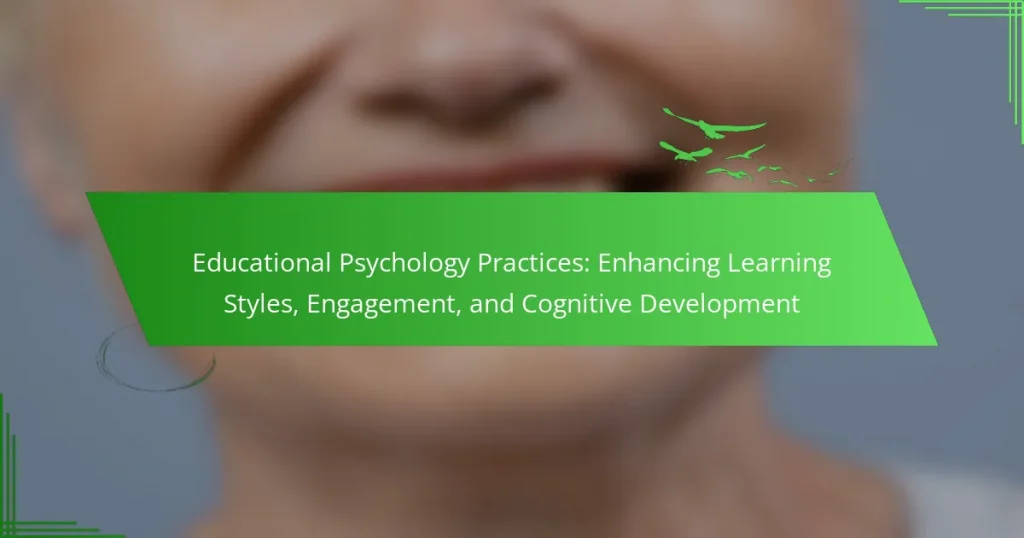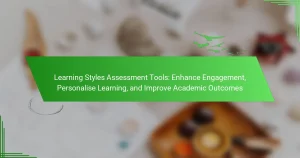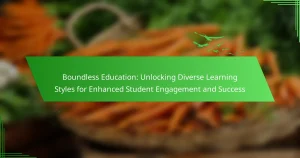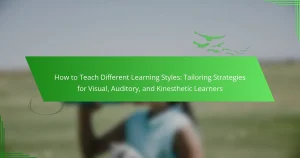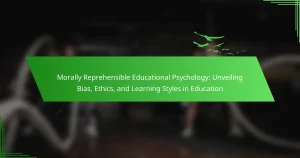Enhancing learning styles, engagement, and cognitive development is crucial for academic success. Educational psychology practices employ strategies like differentiated instruction and formative assessments to cater to individual needs. These methods promote metacognition and adaptability, fostering a supportive learning environment. By incorporating unique approaches such as gamification and project-based learning, educators can significantly improve student outcomes.
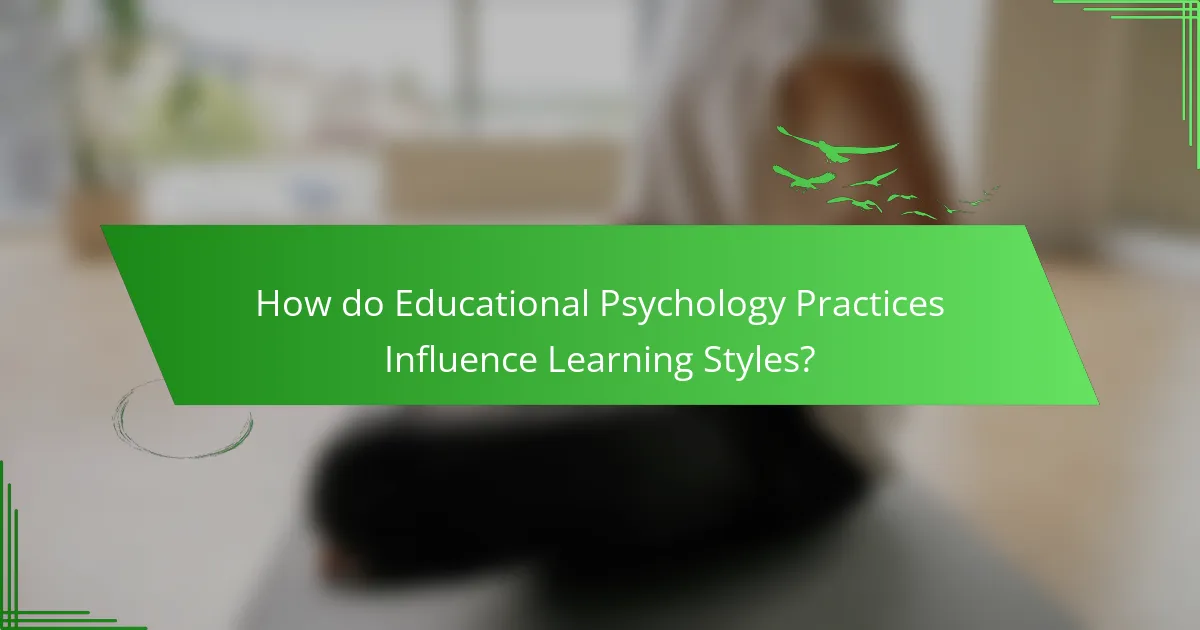
How do Educational Psychology Practices Influence Learning Styles?
Educational psychology practices significantly enhance learning styles by tailoring educational experiences to individual cognitive preferences. These practices incorporate various strategies that promote engagement and cognitive development, such as differentiated instruction and formative assessments.
Research indicates that aligning teaching methods with students’ unique learning styles can lead to improved academic performance. For instance, visual learners benefit from graphical representations, while auditory learners excel with verbal instructions.
Additionally, educational psychology emphasizes the importance of metacognition, helping students become aware of their learning processes. This self-awareness fosters adaptability in learning strategies, allowing students to optimize their educational experiences.
By integrating these practices, educators can create a supportive learning environment that acknowledges diverse learning styles, ultimately enhancing student engagement and achievement.
What are the key learning styles identified in educational psychology?
The key learning styles identified in educational psychology are visual, auditory, and kinesthetic. Visual learners prefer images and diagrams, auditory learners excel with spoken information, and kinesthetic learners thrive through hands-on experiences. Understanding these styles enhances engagement and cognitive development in educational practices.
How do individual differences affect learning preferences?
Individual differences significantly influence learning preferences by shaping how individuals absorb, process, and retain information. Factors such as cognitive styles, personality traits, and cultural backgrounds contribute to these preferences. For example, visual learners may benefit from diagrams, while auditory learners prefer lectures.
Research indicates that tailoring educational approaches to accommodate these differences enhances engagement and retention. A study found that students who received instruction aligned with their learning preferences showed improved academic performance. Additionally, recognizing unique attributes, such as motivation levels and prior knowledge, further personalizes the learning experience.
As a result, educators should assess individual differences to develop effective instructional strategies. This approach not only fosters cognitive development but also promotes a more inclusive learning environment.
What role does sensory modality play in learning styles?
Sensory modality significantly influences learning styles by enhancing engagement and retention. Different modalities, such as visual, auditory, and kinesthetic, cater to individual preferences, allowing learners to absorb information effectively. Research shows that students who engage multiple sensory modalities during learning experience improved cognitive development and information recall. For instance, incorporating visual aids alongside verbal instructions can lead to better understanding and retention of complex concepts. Understanding these modalities helps educators tailor their teaching strategies to meet diverse learner needs.
How do cultural factors shape learning preferences?
Cultural factors significantly influence learning preferences by shaping values, communication styles, and social interactions. For instance, collectivist cultures may prioritize group learning, while individualistic cultures emphasize personal achievement. These differences affect engagement strategies and cognitive development approaches in educational psychology. Understanding these cultural dimensions helps educators tailor their practices to enhance learning outcomes effectively.

What are the universal attributes of effective educational psychology practices?
Effective educational psychology practices focus on understanding and enhancing learning styles, engagement, and cognitive development. Key universal attributes include individualized learning approaches, evidence-based strategies, continuous assessment, and fostering a supportive environment. Individualized learning approaches cater to diverse student needs, promoting engagement and motivation. Evidence-based strategies utilize research findings to implement effective teaching methods. Continuous assessment tracks student progress, allowing for timely interventions. A supportive environment encourages collaboration, inclusivity, and emotional well-being, crucial for cognitive development.
How do these practices enhance student engagement?
Educational psychology practices enhance student engagement by fostering active participation and personalized learning experiences. Techniques such as collaborative learning and differentiated instruction cater to diverse learning styles, promoting deeper cognitive connections. Research indicates that students involved in interactive activities demonstrate increased motivation and retention rates. Furthermore, incorporating feedback mechanisms allows educators to adapt their approaches, ensuring that students remain invested in their learning journey.
What techniques are commonly used to assess learning styles?
Common techniques to assess learning styles include surveys, observational assessments, and learning style inventories. Surveys, such as the VARK questionnaire, identify preferences in visual, auditory, reading/writing, and kinesthetic modalities. Observational assessments involve teachers noting student engagement and responses during various instructional methods. Learning style inventories, like the Kolb Learning Style Inventory, categorize learners based on their experiential learning preferences. These techniques enhance educational psychology practices by tailoring instruction to individual needs, improving engagement and cognitive development.
How do feedback mechanisms improve learning outcomes?
Feedback mechanisms significantly enhance learning outcomes by providing timely information about performance. They guide learners in understanding concepts and adjusting strategies. Frequent feedback fosters engagement, encourages self-reflection, and promotes mastery of material. Research shows that students receiving regular feedback demonstrate higher retention rates and improved academic performance. This iterative process supports cognitive development by reinforcing knowledge and addressing misconceptions.
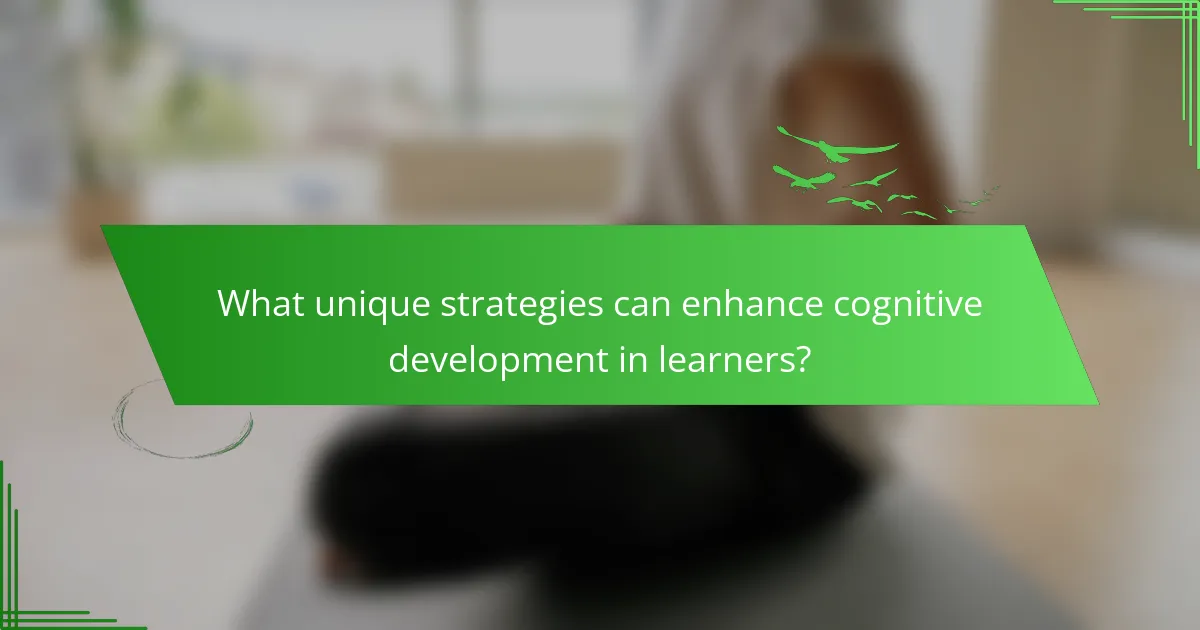
What unique strategies can enhance cognitive development in learners?
Incorporating unique strategies can significantly enhance cognitive development in learners. Techniques such as differentiated instruction, gamification, and project-based learning foster engagement and cater to diverse learning styles.
Differentiated instruction tailors teaching methods to individual learner needs, promoting better understanding and retention. Gamification introduces game-like elements to learning, making it enjoyable and motivating, which can lead to improved focus and cognitive engagement. Project-based learning encourages critical thinking and problem-solving by allowing learners to explore real-world challenges.
Additionally, incorporating mindfulness practices can enhance concentration and emotional regulation, further supporting cognitive development. These strategies collectively create a rich learning environment that nurtures cognitive growth and engagement.
How does differentiated instruction cater to various learning styles?
Differentiated instruction effectively addresses various learning styles by tailoring teaching methods to individual needs. This approach enhances student engagement and cognitive development by recognizing unique attributes of learners. For instance, visual learners benefit from graphic organizers, while auditory learners thrive in discussions. Research indicates that personalized strategies improve retention and understanding, making education more accessible. Differentiated instruction fosters an inclusive environment, ensuring all students can succeed based on their distinct learning preferences.
What is the impact of collaborative learning on cognitive development?
Collaborative learning significantly enhances cognitive development by fostering critical thinking and problem-solving skills. It encourages active engagement and communication among peers, leading to deeper understanding and retention of knowledge. Studies show that students involved in collaborative learning exhibit improved academic performance and greater motivation. This approach also cultivates social skills and emotional intelligence, essential for holistic cognitive growth.
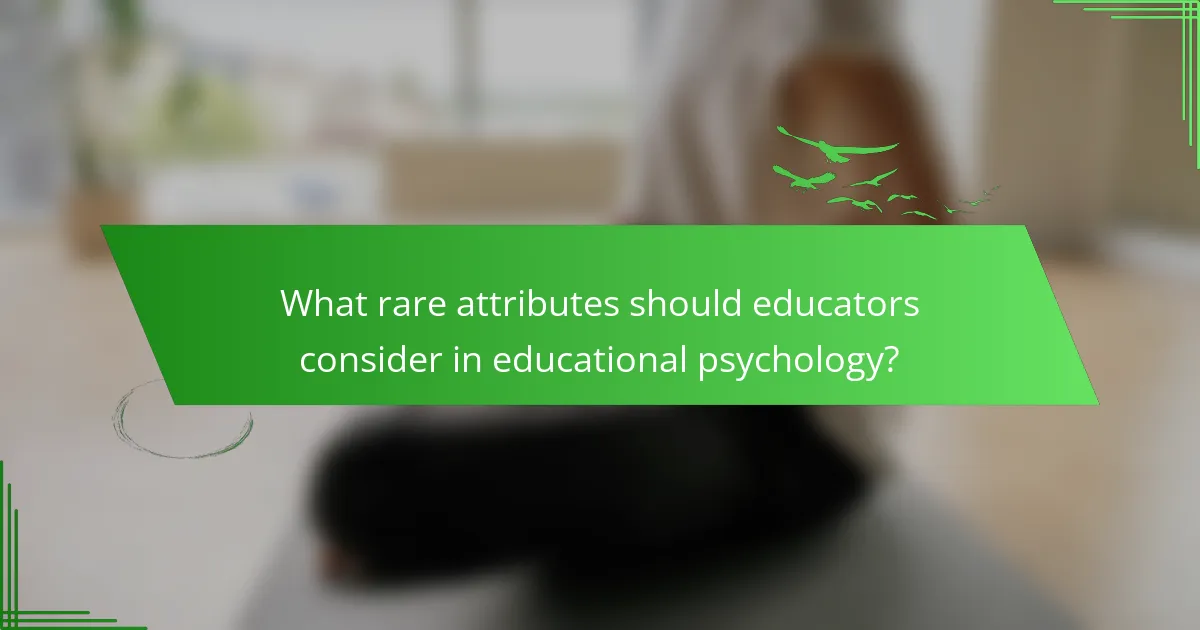
What rare attributes should educators consider in educational psychology?
Educators should consider rare attributes such as emotional intelligence, cultural responsiveness, and neurodiversity awareness in educational psychology. These attributes enhance understanding of diverse learning needs, fostering inclusive environments. Emotional intelligence aids in recognizing student emotions, while cultural responsiveness ensures teaching methods resonate with varied backgrounds. Neurodiversity awareness supports tailored approaches for students with different cognitive profiles, promoting engagement and cognitive development.
How can technology be leveraged to support diverse learning styles?
Technology can enhance diverse learning styles by providing personalized, interactive, and adaptive learning experiences. Tools like learning management systems, educational apps, and virtual reality cater to visual, auditory, and kinesthetic learners.
Adaptive learning platforms analyze student performance, adjusting content delivery to meet individual needs. For instance, platforms like Khan Academy offer personalized learning paths based on student progress.
Interactive technologies, such as gamification and simulations, engage learners by making education more dynamic. These methods promote active participation, which is beneficial for students who thrive in hands-on environments.
Additionally, collaboration tools facilitate peer interaction, allowing students to learn from one another, catering to social learners. By leveraging these technologies, educators can create inclusive environments that support varied learning preferences.
What innovative practices have emerged in recent years?
Innovative practices in educational psychology have focused on personalized learning, technology integration, and social-emotional learning. These approaches enhance learning styles, engagement, and cognitive development. Personalized learning tailors educational experiences to individual needs, improving outcomes. Technology integration, such as adaptive learning platforms, fosters engagement through interactive content. Social-emotional learning promotes emotional intelligence, creating a supportive learning environment. These practices reflect a shift towards holistic education strategies that address diverse student needs and learning preferences.

What actionable steps can educators take to implement these practices effectively?
Educators can implement effective educational psychology practices by adopting specific strategies. First, they should assess individual learning styles through surveys or observations to tailor instruction. Next, integrating active learning techniques, such as group discussions and hands-on activities, enhances engagement. Additionally, providing timely feedback fosters cognitive development and helps students reflect on their learning progress. Lastly, incorporating technology tools can facilitate personalized learning experiences, accommodating diverse needs.
What are the best practices for integrating learning styles into lesson planning?
Integrating learning styles into lesson planning improves engagement and cognitive development. Focus on diverse teaching methods tailored to visual, auditory, and kinesthetic learners.
Incorporate multimedia resources, such as videos and interactive activities, to cater to different preferences. Assess student feedback regularly to refine approaches based on effectiveness.
Utilize differentiated instruction techniques, allowing students to choose activities that align with their strengths. This enhances motivation and retention of information.
Lastly, foster a collaborative environment where students can share their learning preferences, promoting peer learning and engagement.
What common mistakes should educators avoid when applying these strategies?
Educators should avoid several common mistakes when applying educational psychology practices. Failing to consider diverse learning styles can hinder engagement. Ignoring student feedback limits cognitive development. Overemphasis on standardized assessments may neglect individual progress. Lastly, not fostering a supportive learning environment can reduce motivation.
How can ongoing professional development enhance understanding of learning styles?
Ongoing professional development enhances understanding of learning styles by equipping educators with updated strategies. It encourages the integration of diverse teaching approaches tailored to various cognitive preferences. Continuous learning fosters adaptability, enabling educators to engage students more effectively. Research indicates that professional development linked to learning styles improves educational outcomes, as teachers implement customized learning experiences.
